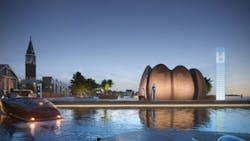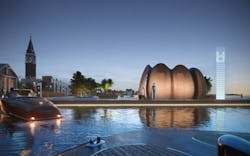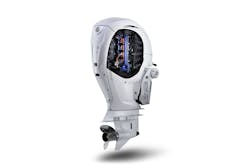Building a Hydrogen Refueling Infrastructure for Recreational Boating
Electrolysis is a promising option for carbon-free hydrogen production from renewable resources. For recreational boating, and with the world becoming increasingly aware of the environmental impact of traditional fuel sources, hydrogen produced via electrolysis can reduce carbon emissions at similar levels as sustainable marine fuels. However, this may significantly cut down on overall range due to the volume required for hydrogen storage.
A new approach to the problem has emanated from a collaboration between NatPower and Zaha Hadid Architects (ZHA) to develop a hydrogen refueling station that supports recreational boating. By using hydrogen fuel cells that emit only warm air and water vapor, the stations will actively contribute to a cleaner environment.
Fabrizio Zago, Group CEO at NatPower, said, “On the back of a renewable project pipeline that already exceeds 23 GW, we decided to create NatPower H—the first global operator for the production, storage, and distribution of green hydrogen—to build the world’s first hydrogen refueling infrastructure for recreational boating.’’
He added, “We believe hydrogen to be one of the most efficient solutions capable of driving the energy transition of the entire recreational boating and yachting industry. Specifically, the use of hydrogen as an energy carrier through fuel cells and electric motors is proving to be one of the most promising options, offering excellent performance while respecting the environment.”
Stations Will Supply “Green Hydrogen”
Designed to be used by recreational boats, these hydrogen refueling stations will supply green hydrogen, which is produced using renewable energy. The first charging station is set to be installed this summer, with 100 planned to be built in 25 Italian marinas and ports by 2030. It’s funded by a €100 million investment led by NatPower H, which is part of the energy company NatPower. The project is set to deliver 100 hydrogen refueling stations by 2030.
ZHA’s design will focus on a Mediterranean perspective, which will allow them to be strategically located at various coastal locations. Station construction will also be fully recyclable using reinforced, dry-assembled masonry, reducing the need for carpentry during construction to minimize construction waste.
The stations will each be divided into eight curved bays. They’re made from 3D-printed concrete blocks with a layered composition designed to echo geometries found in the marine world.
FCHEA Welcomes Yahama Motor
In related news, Yamaha Motor Corp., U.S.A. has joined the Fuel Cell & Hydrogen Energy Association (FCHEA) alongside hydrogen producers, infrastructure providers, and engineering firms. FCHEA is the national industry association for hydrogen energy and fuel-cell technologies in the United States.
“Yamaha plans to work diligently with FCHEA to advance hydrogen energy and fuel cell policies,” said Martin Peters, Director, Yamaha Marine External Affairs, who will serve on the organization’s board of directors. “There is much to be done to prepare the future of decarbonizing the recreational boating and outdoor space, technically and in legislation and policy. We look forward to working as a team with FCHEA and its member companies. We hope others in our industry will join us.”
According to the International Council of Marine Industry Associations (ICOMIA), recreational boats account for less than 0.1% of greenhouse gas (GHG) emissions, specifically 0.7% of transportation carbon-dioxide (CO2) emissions in the U.S. and 0.4% of transportation CO2 emissions in Europe. Due to concentrated efforts within the marine industry, in the last two decades, the U.S. recreational marine industry alone has decreased marine engine emissions by more than 90% and increased fuel efficiency by more than 40%.
Yamaha’s U.S. Marine Business Unit, based in Kennesaw, Ga., markets and sells marine outboard motors ranging in size from 2.5 to 450 horsepower. It also engineers, manufactures, markets, and sells boat control systems, IoT control devices, fiberglass, jet-drive sport boats ranging from 19 to 27 feet, and personal watercraft.
Study Investigates Marine Decarbonization
A recent, first-of-its-kind study commissioned by ICOMIA entitled “The Pathways to Decarbonization for the Recreational Marine Industry” revealed that a multi-plan approach is the best way to continue the decarbonization of recreational boating.
Through the study, the global engineering consulting firm, Ricardo plc, investigated propulsion technologies across nine common recreational watercraft to compare the impact of lifetime global GHG emissions, financial costs, usability, performance, range and infrastructure implications, including battery electric, hybrid electric, hydrogen combustion engines or fuel-cell combustion engines, sustainable marine fuels, and traditional internal combustion engines fueled by petrol or diesel.
Due to the unique water environment of boats, the study found that there’s no “one-size-fits-all” solution, and instead recommends a portfolio of technologies to continue the reduction of carbon emissions within the recreational boating industry. The study considered both battery lifetime in years and recharging cycles, as battery performance is expected to degrade over time regardless of utilization. This factor could result in several battery replacements, even in watercraft that are less frequently utilized.
Yamaha Motor, which has already developed hydrogen engines for automobiles and off-highway off-roaders, is now looking to launch its hydrogen-combustion program into the water. Marine products run through water and are thus subjected to water resistance, requiring significantly more energy for propulsion than land vehicles.
Yamaha's new hydrogen outboard prototype will debut at the upcoming 2024 Miami International Boat Show, previewing a cleaner future for boaters and marine consumers. The company also has been working on a 5.0-liter V8 hydrogen combustion engine for Toyota, possibly hydrogen's most well-known proponent.
Yamaha doesn’t plan to ignore all-electric solutions but will pursue them as part of its multi-pronged approach that will also include carbon-neutral synthetic fuels, fuel cells, and hydrogen engines.


